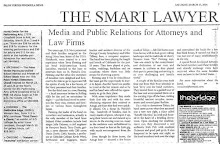One way to think of up media relationships is to consider "proactive" v "reactive" media contact.
Reactive media contact occurs when a journalist calls you up or walks up to you as you leave your office and says, "Hey! Can you answer a few questions for me?"
Proactive media contact occurs when you send out a news release or call up a journalist and say, "Hey! Are you interested in knowing more about this subject?"
Both can be valuable for you [though your best opportunities will be in proactive media]. There are some important differences in how you handle each.
Reactive media contact
While you are always in the drivers' seat when you talk to the media consider reactive media as a dance where the journalist is leading. Once you agree to the dance, you have to follow the journalists' lead to avoid tripping you both up.
A few hints:
Respond to questions in a timely fashion. Journalist's deadlines are cruel. A few hours usually. Maybe the next day. If a journalist volunteers the deadline for the story at issue consider it an honest fact to help guide you, not a threat. The train pulls out of the station on time with you or without you. If the journalist does not tell you their deadline, ask.
In most situations you must respond the same day. In fact you should try to respond within the hour or you risk losing this gift of "earned media" you have been offered. Occasionally a desperate journalist might call you 20 minutes before deadline. If you can help that journalist save their story by providing useful content right then, on the spot, you will have established a relationship that could be helpful for years to come.
Be prepared. Don't just call back to chat. Have your best talking points ready and written down in front of you. If you were asked a preliminary question then have the answer ready. If you could not find the answer then you should call back ASAP so the journalist won't be left hanging. If you promise an answer, fail to follow through, and then wait until 20 minutes before deadline to admit you screwed up you won't be making any friends.
Proactive media.
In this situation you get to lead the dance. That leadership carries responsibility. You are asking the journalist for something that would be very expensive if you had to pay for it--media coverage.
Make sure you have all your facts straight and have spent some time finding the right "hook" to make your story interesting to the journalist and the journalist's audience. If possible brainstorm the idea with someone you trust. Think of the underlying facts as the fact pattern in a client's case. Shine "the light most favorable" on those facts. Find the story hidden in those facts. It is your job to do this, not the journalists'.
You should have written material to support your story. Prepare a simple news release or media advisory. Include a "backgrounder" [a sort of media credibility CV] introducing you and your firm and explaining why a journalist would want to trust what you have to say about this subject.
Contact your journalist but do not bombard him or her. One confirmed contact. All journalists have preferences [phone, fax, email]. Some journalists --like some attorneys-- are idiosyncratic and will be grumpy if you don't follow "their rules." When in doubt, pick up the phone.
When first making contact with a journalist say two things. 1) State your name and, briefly state why you called ["I have a great idea for a story about how the local economy is boosted by the number of law firms here in Capital City"]. 2) Ask if this is a good time to talk.
A journalist under deadline is not interested in much beyond that deadline. Think of this in terms of preparing for trial and you'll understand the mood. Pester a journalist with a dealine looming and at best your story idea won't get the best debut. At worse you'll get grumped at, cut off, and put on that journalist's mental "inconsiderate person" list.
Media coverge is a gift. You are always asking for a favor [though never use such terms]. If the journalist says to talk now, then talk. If the journalist says to call back at another time, then thank them for taking the call and get off the phone. And call back when you said you would!
Sell your story. Really believe in it. Think of your contact with the journalist as if you were addressing a jury. Don't just recite the facts. Tell the journalist your story, why they should care, and why the public will care.
Know when to stop. Don't make a 45 minute closing argument to a journalist. Just outline your story idea and ask if they are interested.
If you handle proactive media contact well you will gain two things: immediate earned media and progress towards building a relationship with the journalist.
Your reputation is your most valuable asset
Subscribe to:
Post Comments (Atom)







No comments:
Post a Comment